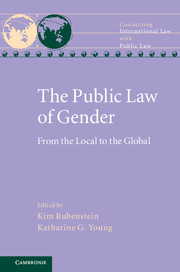Description
The Public Law of Gender
From the Local to the Global
Connecting International Law with Public Law Series
Coordinators: Rubenstein Kim, Young Katharine G.
Examines the public law of gender and equality from the perspectives of comparative constitutional law, international law and governance.
Language: English
Subject for The Public Law of Gender:
The Public Law of Gender
Publication date: 05-2016
Support: Print on demand
Publication date: 05-2016
Support: Print on demand
The Public Law of Gender
Publication date: 12-2018
Support: Print on demand
Publication date: 12-2018
Support: Print on demand
Description
/li>Contents
/li>Biography
/li>
With the worldwide sweep of gender-neutral, gender-equal or gender-sensitive public laws in international treaties, national constitutions and statutes, it is timely to document the raft of legal reform and to critically analyse its effectiveness. In demarcating the academic study of the public law of gender, this book brings together leading lawyers, political scientists, historians and philosophers to examine law's structuring of politics, governing and gender in a new global frame. Of interest to constitutional and statutory designers, advocates, adjudicators and scholars, the contributions explore how concepts such as equality, accountability, representation, participation and rights, depend on, challenge or enlist gendered roles and/or categories. These enquiries suggest that the new public law of gender must confront the lapses in enforcement, sincerity and coverage that are common in both national and international law and governance, and critically and pluralistically recast the public/private distinction in family, community, religion, customary and market domains.
Introduction: a public law of gender? Katharine G. Young; Part I. Constitutional Design and Gendered Outcomes: 1. Feminisms and constitutions Vicki Jackson; 2. Deference and deferral: constitutional structure and the durability of gender-based nationality laws Kristin A. Collins; 3. The court and the women: structural litigation and grassroots organizing for internally displaced people's rights in Colombia Julieta Lemaitre and Kristin Bergtora Sandvik; Part II. Constitutional Design in a Global Setting: The Challenge of Local Custom: 4. Customary law, constitutional law and women's equality Susan H. Williams; 5. Customising equality in post-conflict constitutions Laura Grenfell; 6. Gender equality in international law and constitutions: mediating universal norms and local differences Vijaya Nagarajan and Archana Parashar; 7. Law as a placeholder for change? Women's rights and realities in Afghanistan Sari Kouvo and Corey Levine; Part III. Localising Participation and Voice through Law: 8. Polygamy: who speaks for women? Beverley Baines; 9. In her own voice: oral (legal) history's insights on gender and the spheres of public law Kim Rubenstein; Part IV. Governance, Government, and Gendered Measures: 10. Good governance, gender equality and political representation: ideas as points of disjuncture Sharon Bessell; 11. Women in government/governance in New Zealand: a case study of engagement over forty years Margaret Wilson; 12. Equality without freedom? Political representation and participation of women in Vietnam Huong Nguyen; 13. Gender, justice and statistics: the case of poverty measurement Scott Wisor; Part V. Governance, Equality and Non-Discrimination: 14. Gender and race in the constitution of groups: the limits of non-discrimination law in settler societies Kirsty Gover; 15. Rethinking the Australian model of promoting gender equality Dominique Allen; 16. Gender, governance and defence of the realm: globalising reforms in the Australian Defence Force Susan Harris Rimmer; Part VI. Global Governance and the Precepts of Public Law: 17. Feminisms, pluralisms and transnationalism: on CEDAW and national constitutions Vicki Jackson; 18. Governing gender justice and victims' rights through the International Criminal Court Louise Chappell; 19. International organisations as employers: searching for practices of fair treatment and due process rights of staff Osmat Jefferson and Innokenti Epichev; 20. Transcending gender inequity in an age of impunity: a gender critique of accountability in global administrative governance Rohan Kapur and Kellin Kristofferson; 21. The future we want: an ecofeminist comment on the UN Conference on Sustainable Development Kate Wilkinson.
Kim Rubenstein is Professor and Director of the Centre for International and Public Law at the Australian National University College of Law, where she is also a Public Policy Fellow.
Katharine G. Young is an Associate Professor at Boston College Law School. Her fields of expertise include comparative public law and international human rights law.
Katharine G. Young is an Associate Professor at Boston College Law School. Her fields of expertise include comparative public law and international human rights law.
© 2024 LAVOISIER S.A.S.



